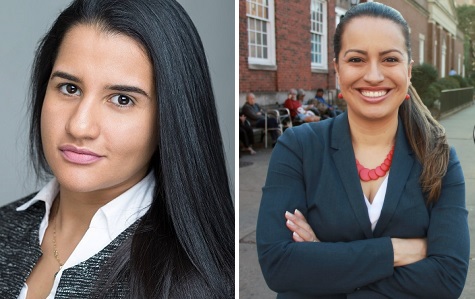
Friends of Ari Espinal/Catalina Cruz for Assembly
Ari Espinal and Catalina Cruz are set to give voters in Corona, Elmhurst a Jackson Heights a choice in September, though not on Special Election Day.
With 11 state legislative seats currently vacant, two in the Senate and nine in the Assembly, Governor Andrew Cuomo issued a proclamation on February 5 for an April 24 special election. Among those who will have the opportunity to vote this April are residents of Assembly District 39, which covers parts of the Corona, Elmhurst, and Jackson Heights neighborhoods in Queens.
The District 39 seat was previously held by Francisco Moya, who served in the position for seven years before his successful bid for New York City Council last November, in which he won a contested primary and then ran unopposed in the general election. Running unopposed was not new for Moya who was without a general election challenger in each of his four races for State Assembly, from 2010 to 2016. (He did face a primary challenge in 2010.)
Since 2006, when Moya’s predecessor in the 39th district Assembly seat, Jose Peralta, held that office, voters in District 39 have faced a single choice for the seat on Election Day. Peralta had a primary challenge in 2006, but not in 2008.
This April will likely be no different. The special election process for State Assembly does not allow for primary voting. Rather, the decision of who will be on a party’s ticket falls to its District Leaders. On February 12, the Democratic District Leaders for District 39 selected Aridia “Ari” Espinal as its nominee in a unanimous vote. Espinal, who is a former aide to Moya, received his endorsement for the position, along with the endorsement of the New York State United Teachers federation.
The Queens County GOP confirmed to City Limits that it will not be presenting a challenger for the special election, an unsurprising decision given that the district leans heavily Democrat.
At this time, no other candidates have presented themselves as possible contenders.
Turnout for this special election, as with most special elections and elections that occur outside a presidential election year, is not expected to be high.
The winner will serve for the remainder of the legislative term, which runs through December.
Voters of District 39 could have another choice to make in this year’s Democratic primary, which is held the September before the November general election that decides who represents the district in the term beginning in January 2019.
Espinal is likely to face Catalina Cruz, the former Chief of Staff to Julissa Ferreras-Copeland, who held the 21st Council District seat prior to Moya.
It’s unclear that turnout will be much better then: Of the 29,651 residents of District 39 currently enrolled in the Democratic Party, on average only 10 percent turn out to vote in their state and local primary elections according to a report by New York City’s Board of Elections. This means that of the nearly 124,000 residents of District 39, only 2 percent will likely determine who will end up as the Democratic Party nominee, and, by default, the winner of the general election.
In his State of the City address on February 13, Mayor de Blasio spoke about a 10-point plan for strengthening democracy within the city. The plan includes getting more New Yorkers registered to vote, making it easier for voters to cast their votes, and making it easier for New Yorkers to run for office.
During his race for the 21st Council District seat last November, Moya helped to reveal just how difficult it can be for outside candidates to get their names on the ballot. Faced with the possibility of running against three grassroots contenders and political veteran Hiram Monserrate in the Democratic primary, Moya, with the help of Espinal, set about challenging the petition signatures of the three outsiders—a time-honored tactic in city elections. Moya was successful in eliminating the three contenders, and voters in the Democratic primary were left to choose between Moya and Monserrate, a man convicted of corruption and domestic abuse.
The process of running for office is expensive, time-consuming, and complicated by the fact that potential candidates for any Assembly district need to acquire 500 signatures to run in a party’s primary or 1,500 to run as an independent. To be valid, these signatures must come from a registered voter who resides in the district and who has not already signed a petition for someone else. And if the candidate is hoping to run under a party affiliation, that signer must also be enrolled in the party. It’s an arduous task for those without the resources of established candidates, and one that can be quickly undone, as occurred last year.
Neither Espinal nor Cruz had many resources on hand at the time of their January report to the state Board of Elections: Espinal had $33,000 and Cruz just over $21,000.
It’s not clear how much issues will matter in the race. A policy paper circulated by the Espinal campaign lists as a first priority building new school capacity to reduce overcrowding in Corona, and commits to ending all use of temporary trailers. Cruz is emphasizing fixing the MTA: She advocates breaking the transit agency into smaller parts and giving New York City direct control of the system within its borders.
Correction: Due to an editing error, an earlier version of this story reported that Cruz would contest the special election.









2 thoughts on “Voters in Queens Assembly District Could See a Rarity in September: A Contested Race!”
Very interesting and informative article, well written and helped me to understand the sytem a lot more.
Pingback: – Cruz to Take on Espinal in April Election – a ‘Rarity’